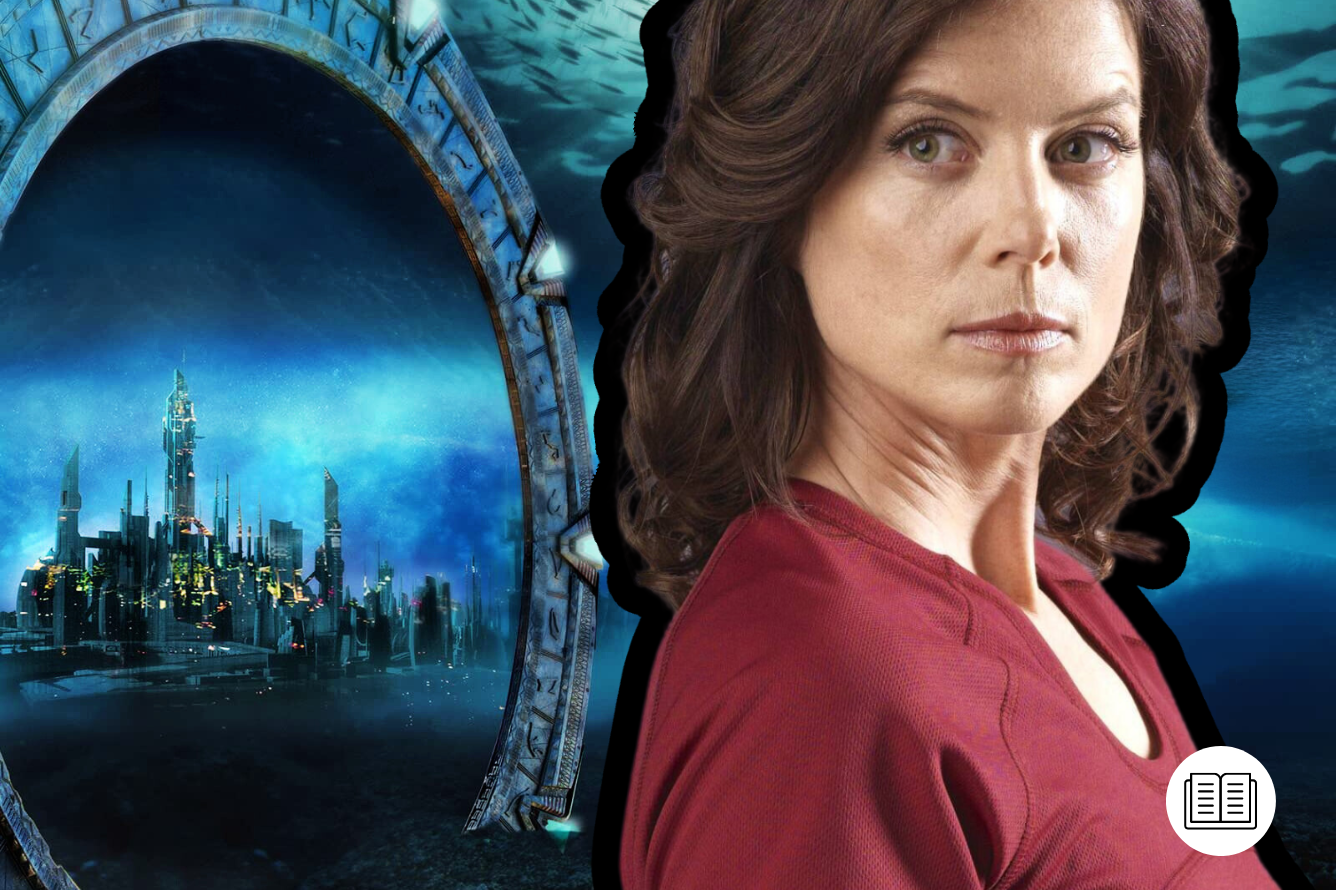There aren’t many characters, or people in real life, that I am drawn to as role models, but I accidentally found mine. Or she found me. My role model demonstrated expert leadership, fierce loyalty, strength when tested, and compassion, always.
I am, of course, talking about Dr. Elizabeth Weir, brought to her full potential by Torri Higginson.
Elizabeth came into my life when I needed her the most, during my teenage years when most people need a sense of direction, purpose, or simply hope in their ‘primitive’ beginnings. I was no different. This was at a time when I felt disconnected from my friends, my peers, and society; I was drifting. Ghost-like. I kept feeling like I didn’t belong here, that there has to be something more than this. On the surface, I wasn’t sure who I wanted to be. Deep down I knew the decisions I needed to make, but my choices collided with the advice of friends and family.
For many of us, society dictates the rules and points us in specific directions. Elizabeth faced the exact same challenges, but instead of conforming, she stepped up as a leader and chose her own path. Her actions inspired me to go down the route of uncertainty, suspense, and adventure, taking my own one-way trip to explore my own ‘new galaxy’, whatever that meant. But enough about me, for now.
A New Kind of Leader for Stargate
Stargate SG-1 introduced us to great leaders such as Jack O’Neill (Richard Dean Anderson), Samantha Carter (Amanda Tapping), and General Hammond (Don S. Davis), but one advantage they all had in common is that they were US Air Force comrades in arms, protected by the chain of command. No matter how crazy an idea, they were military and would be listened to and accepted. As we know, that’s the way it is. Protect your own.

In contrast, Elizabeth Weir was not a soldier but a civilian. She wasn’t one of them; she was an outsider. It makes her appointment by President Hayes as the leader of the Atlantis Expedition – possibly the world’s most important expedition – all the more impressive. True, she did not have the expertise of commanding troops or handling a P90. Instead, her weapon was not ordnance but ordered words, words including diplomacy, responsibility, and sacrifice.
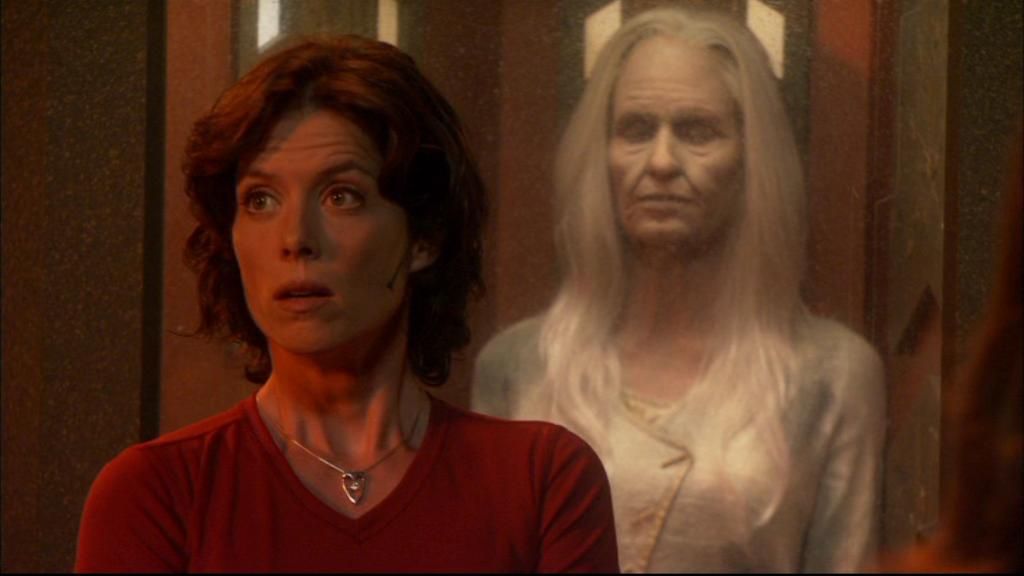
There would be no Atlantis to explore if 10,000-year-old Elizabeth hadn’t sacrificed the rest of her life to save the city. The Stargate Atlantis episode ‘Before I Sleep’ (S1, Ep15) is the first moment we truly realize how much Atlantis and the possibility of exploring it, is monumentally important to her:
Elizabeth Weir: It worked—the stasis, the fail-safe. You gave up your entire life.
Old Elizabeth Weir: No, because we are the same person. The best part of my life is just beginning. I’m exploring a new galaxy. I have years ahead of me still. Trust yourself, Elizabeth. All that matters… is right now.
This little bit of dialogue changed my life. All that matters is right now and it’s true, we don’t know what the future holds, but we know how quickly it can change. Elizabeth’s sacrifice was truly unselfish and she found her purpose – Atlantis. Here she is for the second take, ready to lead and explore what has already become her heart’s home.
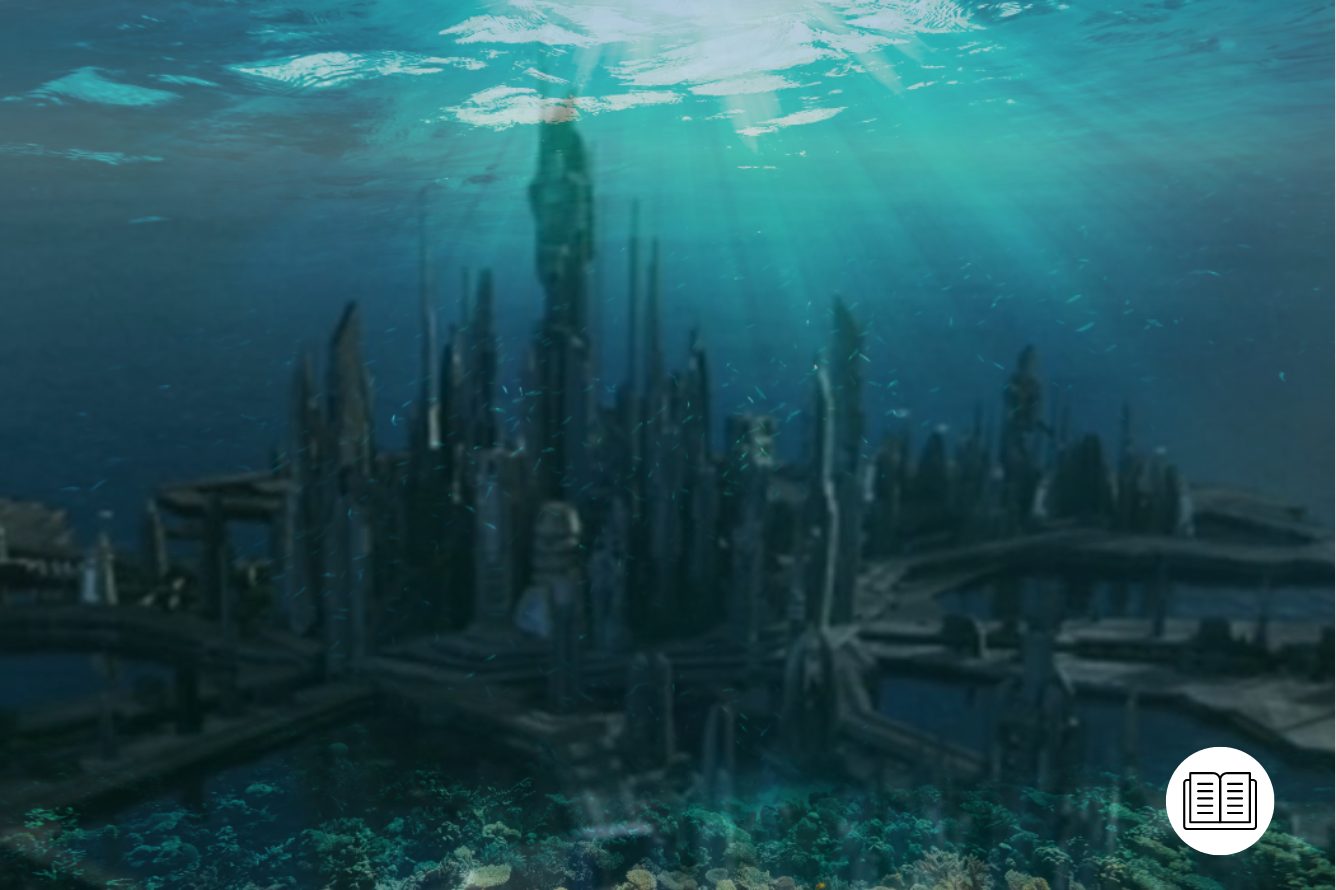
Elizabeth Weir Stood Her Ground
As a forward thinker and a female leader, Elizabeth received many challenges from both civilian colleagues and military leaders; oftentimes these tensions came in different forms. Funnily enough, all of them were with men.
As an example, Elizabeth had to face Dr. Pete Kavanaugh (Ben Cotton)’s – the character, we all love to hate – views on not only her leadership abilities, a tedious heart-over-head refrain heard by women in positions of responsibility everywhere:
“Everything you do is motivated by personal feelings. You’re driven by emotion, not reason. It’s why I’ve always felt you’re not capable of doing this job.”
Elizabeth handles his criticisms with diplomacy, patience, and yet with authority, she chooses not to retaliate and defend herself, but to remain composed. That is something to be admired. However, in trying to keep the peace, Elizabeth often came across as being coldly calculating in the opinions of many fans at the time, but personally, I think they were just missing Carter.
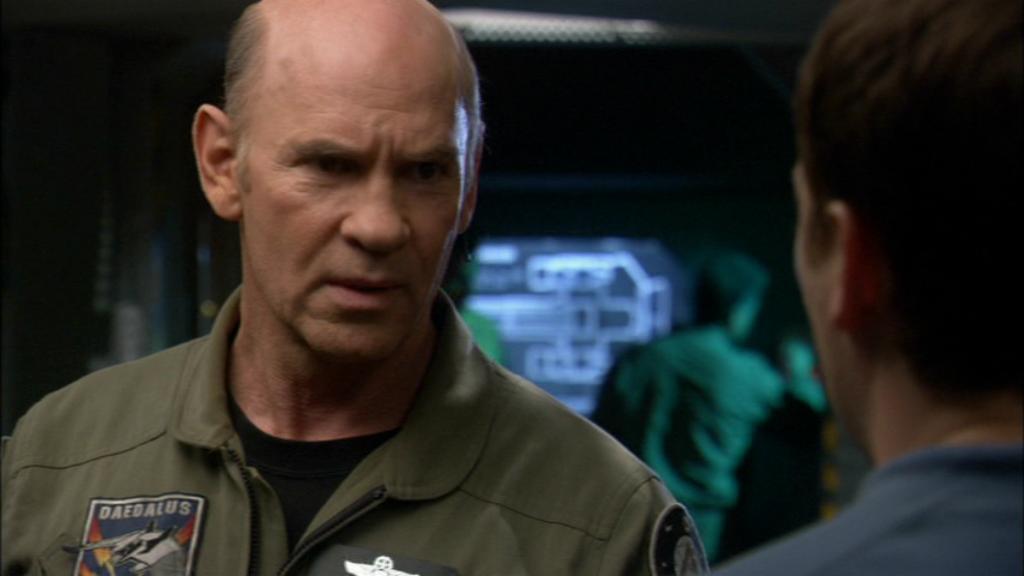
Similarly, Elizabeth’s demeanor often put her at odds with her military counterparts. The Stargate Atlantis episode ‘The Intruder’ (S2, Ep2) is a great example of this tension when discussing the next military commander in a room of male authority figures in General Henry Landry (Beau Bridges), Colonel Steven Caldwell (Mitch Pileggi) and others. However, Elizabeth’s perceived ‘coldness’ stems from a deep loyalty to her team as she stands her ground in fighting for Sheppard:
“I shouldn’t have to remind you gentlemen that I continue to have the support of the President and our foreign allies. You don’t want to fight me on this one.”
She then walks out, without another word, leaving Caldwell and the others speechless. It’s a turning point for a civilian diplomat, facing down the united front of a military stonewall. As a young woman, it was so refreshing to see this moment of truth. She knows she has the upper hand and when she’s heard enough, boom. One to Weir – Nil for to military.
Now one of my favorite relationships in Stargate Atlantis is the relationship between Weir and Caldwell. There is so much tension at the beginning and a lack of faith that the other knows their stuff. Granted Caldwell was under the influence of the Goa’uld for some time, and Weir was playing host body to Phoebus. In their first meeting abroad Daedulus, both are defending their territory and are at loggerheads over who has the higher authority and who should, essentially, ‘save the day’. Over time they grow to respect one another, aiding and saving each other’s lives. I know full well this is a ‘ship’, but I’m all aboard ship-Sheppard, and the fact that Caldwell calls Elizabeth up over her relationship with Sheppard in the episode ‘Conversion’ (S2, Ep8) shows that he has a little more fondness for her and maybe a hint of jealousy.
Steven Caldwell: You two are pretty close, aren’t you?’
Elizabeth Weir: Well, we’ve been through a lot together. Yes.
Silence can be powerful, albeit can come across as cold. However, her steady leadership eventually turned these struggles, such as her relationship with Caldwell into one of mutual respect.
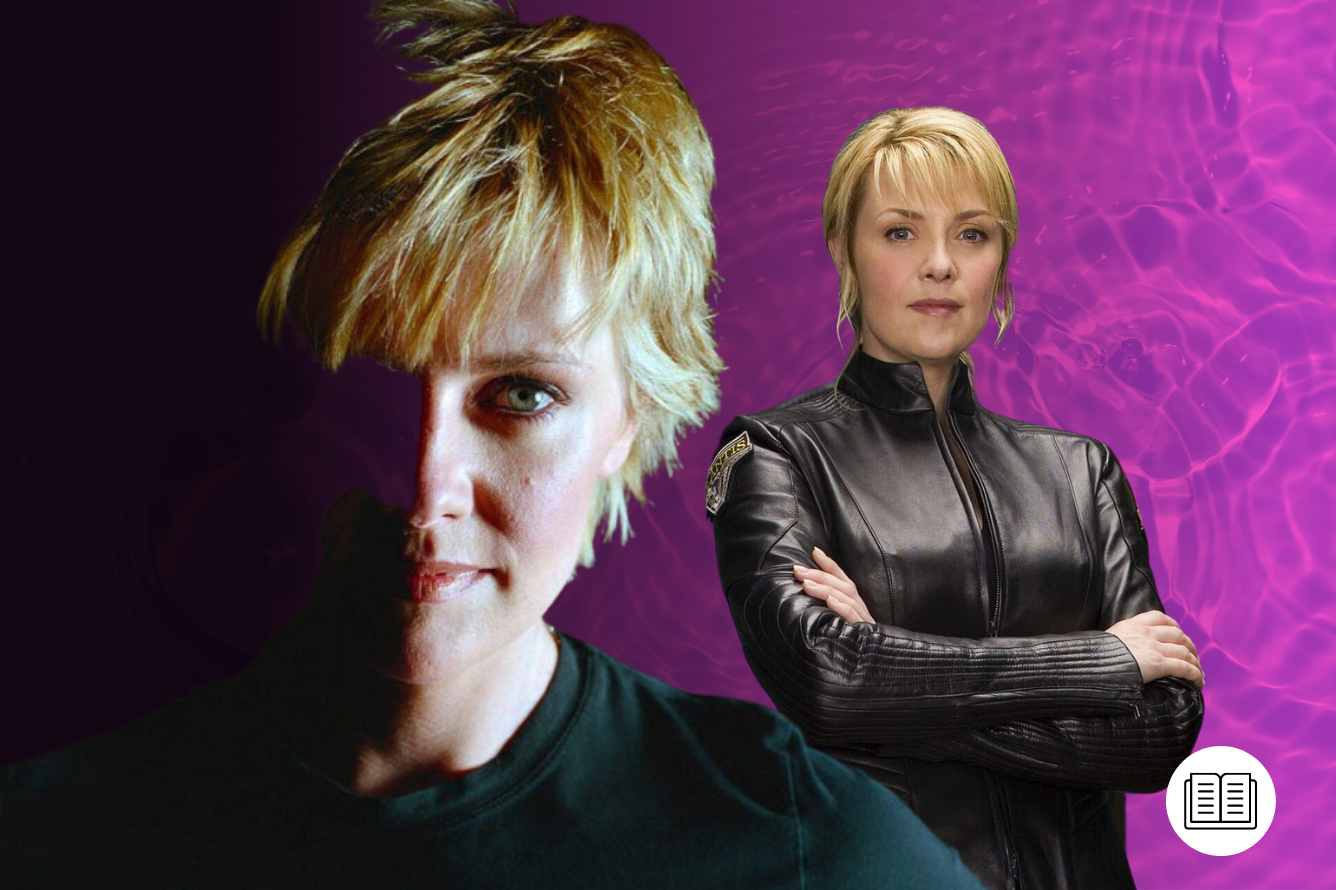
Elizabeth Weir’s Ethical Burden
Over Dr. Weir’s three-year command, she has had to make very difficult ethical decisions. The Stargate Atlantis episode ‘Michael’ (S2, Ep18) saw her authorize the capture of the enemy Wraith and experimenting on him. This effort to turn him human is a step towards eradicating the Wraiths’ need to feed.
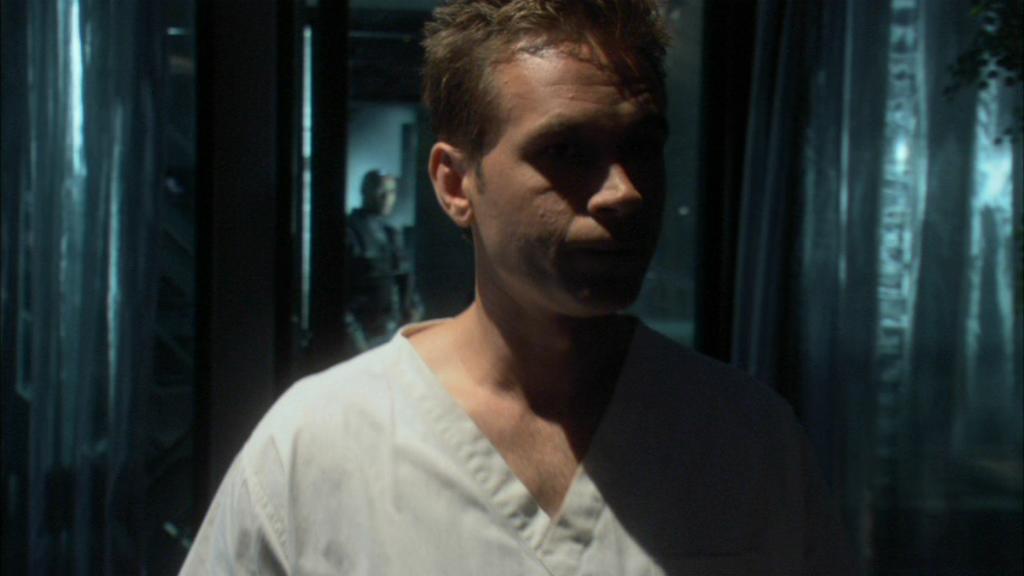
Her conviction when it comes to making difficult decisions endures even when it affects those close to her. In the episode ‘Common Ground’ (S3, Ep7), Elizabeth allows Genii Commander Kolya (Robert Davi) to torture Sheppard rather than giving in to the enemy:
“It was John Sheppard’s last order that we do not submit to Kolya’s demands, and it is my own country’s policy to never yield to terrorists. Those are the reasons you’re still here, Mr. Radim. Because believe me, if it was simply my choice…”
Time and again, Elizabeth faced choices with nearly insurmountable ramifications. With the Wraith, it could have led to genocide. With the Genii, it might have meant submitting to terrorism. In so many instances, Elizabeth had to weigh the fate of her team, and oftentimes humanity, against her own moral code and sacrifice the latter for the former.
Though it can be argued she didn’t always make the right decisions, her mistakes make it clear that she is human. It’s the handling of those mistakes, and owning up to the consequences, that make it clear she is a true leader.
Her failings don’t break her, they make her more determined, to be stronger. It’s these moments in particular that make her so inspiring and relatable. It’s an awesome reminder that one mistake in isolation doesn’t make you a failure, but it’s strength, courage, bravery, and above all the power of will that makes you a success.
Elizabeth Weir’s Final Sacrifice
Finally, what makes Elizabeth a truly good role model is her mental strength and the sacrifices she makes, particularly in her fight with the Asurans, an ultimate battle of wills.
The battle begins in the Stargate Atlantis episode ‘Progeny’ (S3, Ep5), with the introduction of our villain, Oberoth (David Ogden Stiers). Elizabeth first tries diplomacy, creating an alliance in the fight against the Wraith. Upon learning that Elizabeth resides in a Lantean-designed city, Oberoth becomes an aggressor and uses Niam (John O’Callaghan), a Replicator, to infect Elizabeth with nanites.

A short while afterward, in ‘The Real World’ (S3, Ep6), the effect of the nanites infiltrating Elizabeth’s body and mind becomes apparent and she falls into a coma. This episode really resonated with me, not only because it’s a Weir-centric episode, but because in her new reality, everyone was trying to tell her to give up, that Atlantis was only a dream, an escape from trauma and she had to give up that dream if she ever wanted a normal life. When you know something isn’t right, you feel it in your gut. Your body knows before your mind does. Instinct. Always feeling something is off, that you don’t fit into this particular playground.
The mental strength of Elizabeth in this episode is something I’m sure many of us have felt at one point or another. After submitting to others, to reach a tipping point and gather the strength to stand up for what you believe in and say ‘enough is enough’:
“I know what you told me. But, I also know what I feel. Atlantis is real, and I will get back there.”
As soon as she starts to believe her own story more clues from Atlantis bleed through into her new reality, telling her she is right. She has the confidence to believe in herself, go up against her enemy and make her way back home.
The peace doesn’t last long, however. A little while later, an attack from the Asurans leaves Elizabeth in a critical condition. With her body failing, the dormant nanites are the only solution to save her life. She becomes the physical embodiment of her assumed coldness – part machine.
In the Stargate Atlantis episode ‘Lifeline’ (S4, Ep2), the presumed final chapter of her life, a small Atlantis team takes on a risky mission to steal a ZPM from the Asurans to protect Atlantis from its failing shields. As a final sacrifice to save Sheppard and Ronon, she leaves the protection of the cloaked jumper and challenges Oberoth with his own mind game. She convinces him that he has won but in reality, he played right into her hands:
“I figured you’d messed with our minds, so I’d mess with yours. You didn’t overpower me, Oberoth. The Replicator guards didn’t capture my team. It was all a fictional scenario played out in your mind. In reality, your guards are still frozen and my team is escaping as we speak. You were wrong, Oberoth. I have never underestimated you, but you have clearly underestimated me.”
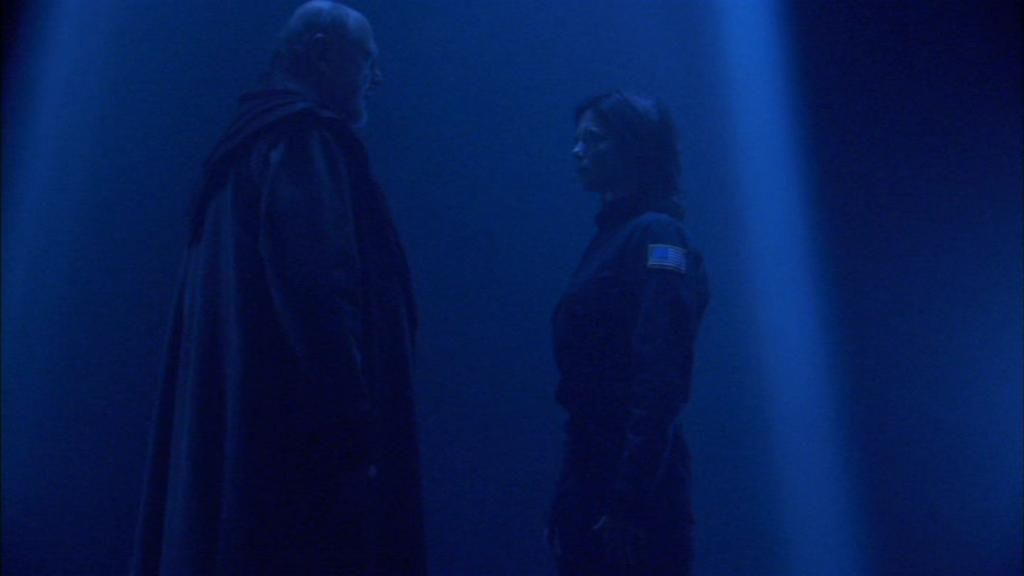
What an end to a truly human character. Weir reaches her greatest potential in this moment, showing the power of her conviction, her intellect, her courage, and her loyalty. Her last act is the ultimate sacrifice of both (part-machine) body and mind, but not her soul.
The Legacy of Elizabeth Weir
The show was never the same without her. It didn’t have that life and joy of exploration. It felt disjointed, it no longer felt like ‘home’. There felt like a lack of a hierarchical command structure. Everyone seemed distant as if they were no longer working together for a common goal. That it was like somehow Atlantis too, was mourning Elizabeth’s ‘death’, as we all know no one ever really dies in sci-fi.
There was also a tonal shift in the continuation of the story from Season 4 onwards. It was darker and more subdued, and not just in the plot, but also in terms of lighting – like comparing the direction of the first two Harry Potter movies with the tonal shift of the third. The magic was gone, but its echoes were still present, especially in the hearts of Sheppard and McKay (David Hewlett).

Elizabeth is deft in diplomacy, she owns her responsibility, and her willingness for self-sacrifice makes her a great role model to everyone, but especially to those who have doubted themselves. In my own Stargate circle, I’ve seen Elizabeth inspire people to become leaders, to apply for politics degrees, or just to get through the day, and she inspired me to start my own company.
I’ve had to learn how to start again when I didn’t know how, to build a team without experience, and make tough decisions in a battle between logic and gut. I often look fondly back to ‘my lessons’ with Dr. Elizabeth Weir, where she taught me to trust my instincts, follow my heart, and search for a place I truly belong, home.
This article was first published on March 28th, 2021, on the original Companion website.
The cost of your membership has allowed us to mentor new writers and allowed us to reflect the diversity of voices within fandom. None of this is possible without you. Thank you. 🙂


